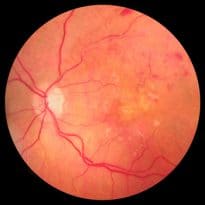With more than 30 clinical trials currently underway for the treatment of inherited retinal diseases (IRDs), it’s imperative that clinicians are aware of the most recent information to get patients on the appropriate paths to clinical trials and future therapies.
Age-related macular degeneration (AMD) is the leading cause of legal blindness in adults over age 50. The development of agents that target vascular endothelial growth factor (VEGF) has revolutionized the treatment of AMD. However, optimal AMD management is impeded by challenges in access to FDA-approved therapies.
Here you will find education on IRDs and AMD that provides insights, guidelines, and information to help you optimize the management of your patients.

 [themo_button text=”Register Now” url=”https://www.cmeoutfitters.com/transfers/cm/?ID=37654″ type=”standard” target=”_blank”]
[themo_button text=”Register Now” url=”https://www.cmeoutfitters.com/transfers/cm/?ID=37654″ type=”standard” target=”_blank”] [themo_button text=”Participate Now” url=”https://www.cmeoutfitters.com/hub-activity/keeping-the-patient-in-the-center-in-amd-care/” type=”standard” target=”_blank”]
[themo_button text=”Participate Now” url=”https://www.cmeoutfitters.com/hub-activity/keeping-the-patient-in-the-center-in-amd-care/” type=”standard” target=”_blank”] [themo_button text=”Participate Now” url=”https://www.cmeoutfitters.com/hub-activity/minimizing-the-burden-of-prior-authorization-in-amd-through-actionable-strategies-and-improved-communication/” type=”standard” target=”_blank”]
[themo_button text=”Participate Now” url=”https://www.cmeoutfitters.com/hub-activity/minimizing-the-burden-of-prior-authorization-in-amd-through-actionable-strategies-and-improved-communication/” type=”standard” target=”_blank”] [themo_button text=”Participate Now” url=”https://www.cmeoutfitters.com/transfers/cm/?ID=32563″ type=”standard” target=”_blank”]
[themo_button text=”Participate Now” url=”https://www.cmeoutfitters.com/transfers/cm/?ID=32563″ type=”standard” target=”_blank”] [themo_button text=”Participate Now” url=”https://www.cmeoutfitters.com/hub-activity/zooming-in-on-the-education-and-empowerment-of-patients-in-amd-care/” type=”standard” target=”_blank”]
[themo_button text=”Participate Now” url=”https://www.cmeoutfitters.com/hub-activity/zooming-in-on-the-education-and-empowerment-of-patients-in-amd-care/” type=”standard” target=”_blank”]